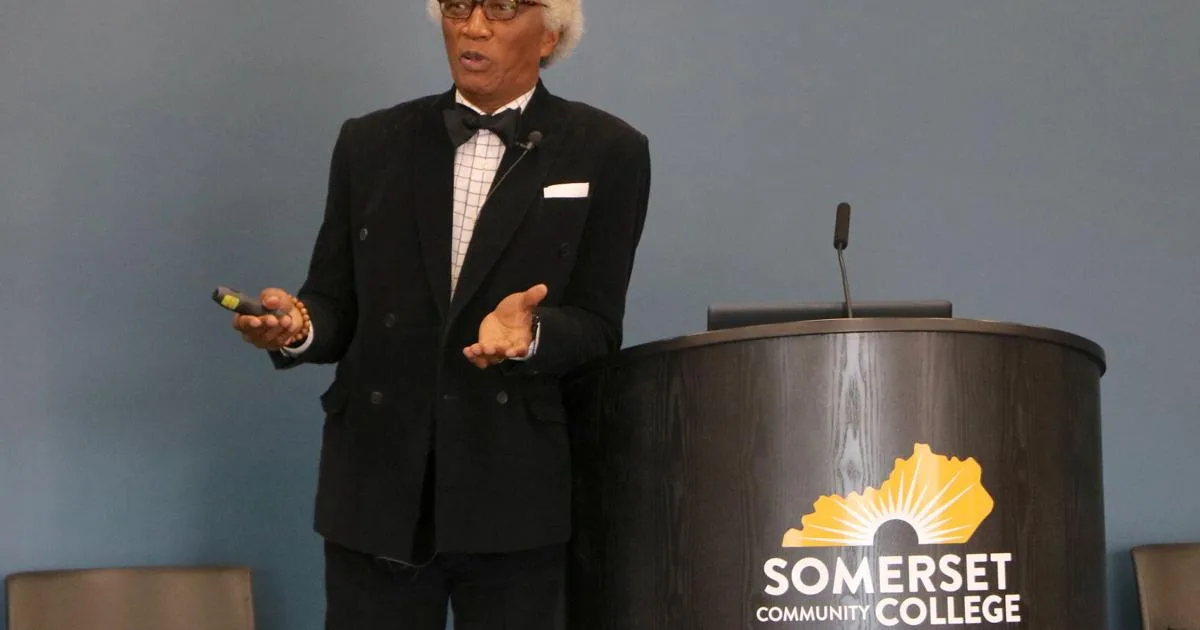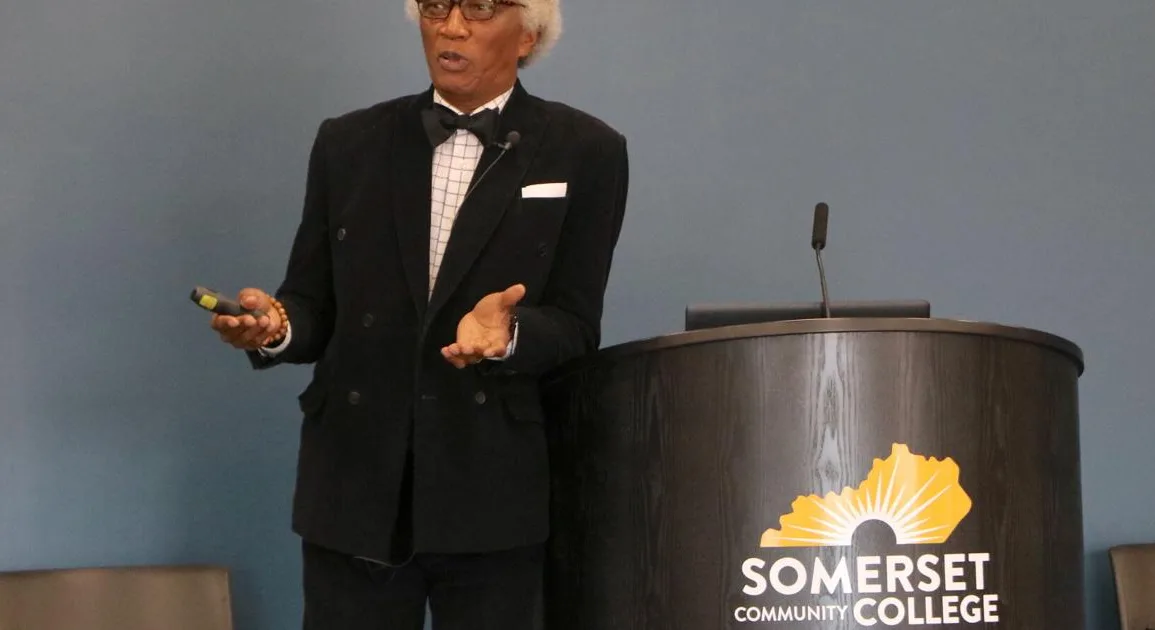
“Eliminate the history of African Americans from the American story, then you eliminate the American story itself, because there’s virtually no aspect of American history that is untouched by African American people.”
That was part of the message that Dr. William H. Turner had for those who turned up to listen to him speak Tuesday at Somerset Community College.
Turner, a native of Harlan County and author of the book “The Harlan Renaissance: Stories of Black Life in Appalachian Coal Towns,” focused not only on his family’s coal town heritage, but also on what southern Black families meant to both the coal mining industry and other aspects of souther culture.
That includes southern music itself, and Turner named his talk “Blues in the midst of Bluegrass on Black Mountain.”
As Turner noted, “The Blues in the mountains of the south, the Blues of the Piedmont, the Blues of the delta of Mississippi, it’s a lot like the music of Hank Williams.”
He then added the names Merle Travis, the Carter Family, Bill Monroe and Johnny Cash to that mix. “They’ll tell you, ‘We learned this stuff from Black people.’”
Bluegrass and Country music can trace its roots all the way back to the first African Americans who were brought in to be slaves in the “New World,” Turner said.
“At the height of slavery … by the time one generation of Africans had replaced themselves with another generation, say by 1650, they had already begun to sing the songs they brought from Africa. It was the slaves who were the minstrels and they entertained at the parties on Friday and Saturday night,” he said.
A few generations later, Elvis Presley started incorporated the rhythm and styles of the soul groups and musicians he listened to, Turner said. “Early on, white males in general, who were thought to be the guardians of something like Victorian morals, decided Elvis Presley was doing ‘Black music.’ And his exotic, sexualized gesturing was just a little bit too much for the moral center of our children. So that many record companies of Black artists wouldn’t put their pictures on their album covers, because they didn’t want people to know they were listening to Black musicians.”
But it is worth noting, Turner said, that while many think of the center of Black culture in the early 20th century to be centered around big northern cities such as New York – and they were – there were Black people living in the south as well, centering in places, perhaps surprisingly, such as Harlan.
When naming his book “Harlan Renaissance,” he intentionally brought to mind the parallels of the “Harlem Renaissance,” the rise of artistic expression that centered on New York in the 1910s through the 1930s.
Turner mentioned the Cotton Club of Harlem, saying, “We had our Cotton Clubs in a way, because at one time Harlan County, Ky., had the highest concentration of Black coal mining families in the whole United States.”
That’s because of the Great Migration as it has been called, the shifting of Black Americans in the post-reconstruction era moving from the southern states to the north.
“America had decided it was largely going to be a Jim Crow nation, so thousands of Black people went up the east cost from Florida, the Carolinas, the Atlantic coast part of Georgia, Virginia, and went on into Baltimore and to Washington, D.C. and Philadelphia and New York and Boston,” Turner said.
“At the same time (from 1890 to 1940), if you go a little further west, then there’s Interstate 65 that goes right up the center of Kentucky, then I-75, and that came out of Alabama.”
Many of the people leaving Birmingham were leaving a coal-producing area, so the Black people moving north were a “ready-made labor force” for the opening coal mines of Kentucky and West Virginia.
“The book grew out of my sense of responsibility, so to speak. That’s to say that coming from that little neck of the woods that was relatively unknown to most people, for most of my time in college and graduate school, and even as a young professor till I was about 30, you find yourself thinking that the very epicenter of Black life and culture was in some big city. It was New York, it was Chicago, it was Baltimore. But I came to realize all of what was in those cities was also in the lives of these people (in the book) who are relatively unknown. I was looking out for that kind of way to return the dignity that I knew was in the lives of even my own family.”
Part of Turner’s talk centered around the politics of looking at history – led off by using the phrase “Make America Great Again,” connected to former president and current presidential candidate Donald Trump.
“If you study history, you might interpret “Make America Great Again” based on where you were in history. When was it great? For whom was it great? Was it great for everybody?”
For example, Turner said that he started going to a “white school,” in his senior year of high school as integration was legally required. One day in class, one of his teachers said that everybody was going to sing the Kentucky state song, “My Old Kentucky Home.”
At that time, the song still had the original lyrics, which intimated that Black people – meaning slaves – were happy at doing their work.
“I said, ‘My mother would wash my mouth out with soap if I sing the Kentucky state song.’ I told (the teacher) my mother would whip me.”
Turner then quoted the line in question, before adding, “Who are you talking about? We weren’t happy. Somebody wrote that song that wasn’t out in a field with my grandma. And you want me to sing this? You’re out of your mind.”
Turner went on to point out that there are attempts even today to either ignore or diminish the study of Black history. He brought up a Kentucky house bill, H.B. 9, sponsored by Waddy Representative Jennifer Decker. Local Representatives Shane Baker and David Meade are also sponsors of the bill.
That bill, Turner said, would force universities and colleges such as SCC to do away with expending resources on diversity, equity and inclusion promotions, effectively doing away with such programs and offices held by people like Dr. Elaine Wilson, SCC’s director of Diversity, Equity and Inclusion.
In addressing SCC President Dr. Carey Castle, Turner said, “It will destroy, Mr. President, everything related to diversity staff positions, equity and inclusion. If the gentlewoman from Waddy has her way, you won’t have any events like this anymore.”



